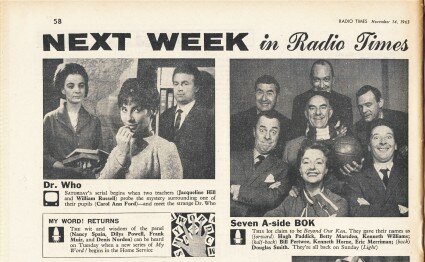

January 26, 2014
50 Glorious Years: Episode 46 - 2008
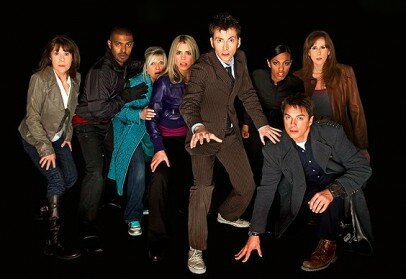
2008 was possibly the most successful year in the tv charts for Doctor Who. Series Four - also Doctor Who‘s 30th Season, broadcast during its 45th year, gave Doctor Who its first ever chart-topping episode, with Journey’s End finishing at #1 for the week it was broadcast. This final episode of the season was as close to an anniversary episode as the new series had received - every companion from the new series (and one from the classic) being brought back to fight the Daleks and the return of Davros. This was the last of four regular runs of 13 episode seasons for the new series broadcast at the same time of the year each year, with Doctor Who surprisingly not enjoying the same regular annual broadcast pattern since then.
Before the 2008 Christmas special, The Next Doctor, was broadcast, David Tennant had announced his departure from the role…......
Posted by Luca on Sunday, January 26 at 8:28 am
(4) Comments
January 19, 2014
50 Glorious Years: Episode 45 - 2007
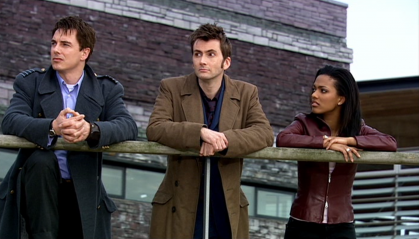
2007 saw unprecedented success for Doctor Who. The emergence of Torchwood in 2006 gave Doctor Who its first regular-series television spin-off - season one debuting in October and finishing up on January 1st 2007. If that wasn’t enough, January 1st 2007 also saw the debut of a second spin-off series, The Sarah Jane Adventures, naturally starring Elisabeth Sladen. While Torchwood was an attempt at an “adult” series and not meant for kids, The Sarah Jane Adventures was the opposite (not that adults couldn’t enjoy or didn’t watch). Both spin-off series became successes in their own right, each going at least four seasons. The Doctor Who franchise was now at its largest, particularly if you were to add the documentary/magazine series Doctor Who Confidential, Totally Doctor Who and Torchwood: Declassified to the mix, it meant 6 different television series related to Doctor Who were being made and regularly aired.
What of the “parent series” (as some called it at the time)? It was so successful that in just its third season it already had a completely different regular cast than it had in its first season, and just kept marching up the ratings. Not too many series can say that. In fact, it is difficult to think of another series that can claim this, and yet it is traditional for Doctor Who (the classic series had done the same thing by its fourth season just over 40 years earlier). Its another example of what a truly unique show Doctor Who is and always has been.
Posted by Luca on Sunday, January 19 at 10:59 am
(0) Comments
January 12, 2014
50 Glorious Years: Episode 44 - 2006
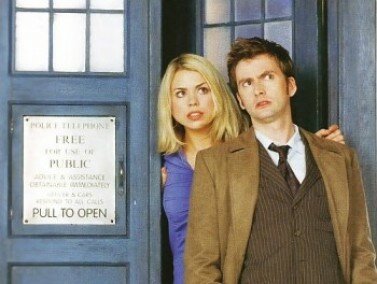
Doctor Who followed up its successful return in 2005 by being just as successful in 2006. With a new Doctor in hand, the importance of Who’s success in 2006 is easy to take for granted. Audiences may not have been so ready for another actor in the lead role, but like the Daleks did 40 years earlier, the popularity of Billie Piper helped smooth over the transition to the new Doctor. Tennant and Piper were only together on screen for one season as a regular TARDIS team, but they have perhaps gone down as the most popular one for the new series all these years later.
The success of the 28th season of Doctor Who in 2006 meant a number of things. It meant that the show could, in modern times, survive a change of lead actor just like the classic series could. It meant that the popularity of the show wasn’t a one-off novelty to bring it back just for a year to see what it would be like in the present day. And most of all, it meant that Doctor Who‘s long-term future was once again secure.
Posted by Luca on Sunday, January 12 at 8:30 am
(1) Comments
January 01, 2014
50 Glorious Years: Episode 43 - 2005

And as you were. Doctor Who came back in 2005 as though it had never been away. A full season, and one for the modern day with a fresh new take on the programme for the 2000’s but which completely respected the show’s past and its continuity. Led by Russell T. Davies, Doctor Who became a mainstream hit once again, enjoying critical acclaim leading to the series even getting a BAFTA award for best drama.
It wasn’t all plain sailing that year - the first episode leaked on to the internet a few weeks before its broadcast, allowing many fans to watch the first episode before the BBC intended them to do so. And then, shortly after the first episode was broadcast to an audience of 10 million viewers in the UK, there was a sudden shock announcement that Christopher Eccleston was already going to be leaving the role at the end of the season. It was an announcement so shocking to fandom that it seemed to overshadow the bigger news that was released at the same time - that, unlike what had been the case in 1996, Doctor Who was going to continue after its first set of planned episodes. Another season was announced to be happening in 2006 and before that, a Christmas special in December that would introduce the new Doctor. Before most people could even breathe, David Tennant was announced as that new Doctor.
Really, a successful of Doctor Who in 2005 shouldn’t have come as a surprise. The BBC finally went for it, giving the show the budget, the support and the promotion it deserved. Given how well the show did without these factors being in place anywhere near to the same degree, plus the increase in television science-fiction and the talent involved which is naturally drawn to work on Doctor Who, there was no way we could lose. What was surprising perhaps is how much of a success it was - exceeding even the most optimistic of predictions.
By Christmas Day 2005, with the new series surviving the change of lead actor so early in its run, Doctor Who was cemented again as a national institution in the UK. We haven’t looked back since.
Posted by Luca on Wednesday, January 1 at 9:52 am
(2) Comments
December 29, 2013
50 Glorious Years: Episode 42 - 2004
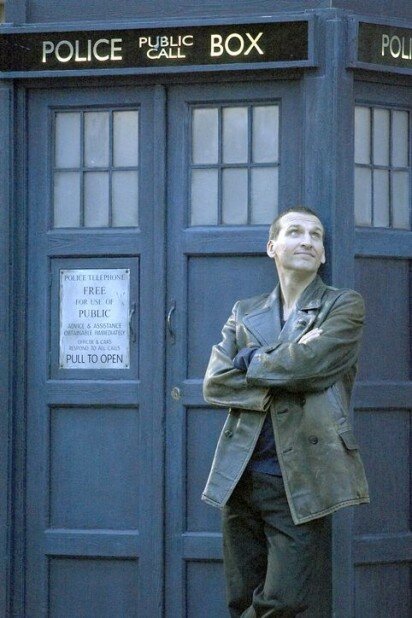
2004 was fun for Doctor Who fans. Safe in the knowledge the show was coming back in a much more permanent way (as a series, rather than a one-off tv movie made with the hope of more tv movies made if the US ratings were high enough), it was a full year of anticipation and speculation on what the new series would be like. Who would be the Doctor? Who would be the companion? What would be new? What would be brought back? Would this be a re-boot or just a continuation?
By the early spring the answer to the first question was provided in the form of Christopher Eccleston, a well-known actor with both significant British TV and Hollywood film experience who’s casting immediately signalled to the world (particularly the tabloid world) that, no, Russell T. Davies wasn’t going to cast a light entertainer/comedian in the part as the tabloid press had kept suggesting would be the case. By May the second question was answered - Billie Piper, then considered the UK answer to Britney Spears, was cast as companion Rose Tyler. Which is what the tabloids had been suggesting would be the case (moral of the story - sometimes the tabloids do get it right!). And on it went, as more and more information came out in drips and bits over the following months, with the first photos of filming released by July.
Of course, Doctor Who wasn’t all about the new episodes this year, just like it hadn’t been for the past number of years. The books and audios continued their regular releases to keep fans entertained with new stories in the interim. Doctor Who fans got a special post-Christmas treat in January of 2004 when it was announced that episode 2 of The Dalek Master Plan - Day of Armageddon had been recovered by the BBC. The third episode from this 12 part epic to be recovered (and the story that was supposed to be the least likeliest to be recovered because of the lack of international sales) was the first newly recovered episode since 1999 when The Lion, part 1 of The Crusade had been found. With just two missing episodes found in the previous 12 years, many fans rejoiced and assumed (and seemed correct for some time) that this might be it in terms of missing episodes that were still out there. Nobody knew then that we’d be wrong at least 11 times over…......but that is another story.
Posted by Luca on Sunday, December 29 at 8:41 am
(0) Comments
December 15, 2013
50 Glorious Years: Episode 41 - 2003

In 2003, the inevitable finally happened. The announcement that Doctor Who fans had all been waiting for came on September 6th 2003 - the announcement that Doctor Who was being brought back as a television series by the BBC. No US network or studio co-production deals to worry about, no contingencies based upon a film happening, and not a webcast with animation. The real deal. It was the best present for the series 40th Anniversary that the fans could have hoped for.
But 2003 had been a glorious year for Doctor Who long before the end of September. The year had begun with the webcast of new animated complete version of Shada with Paul McGann in the role rather than the 4th Doctor. Soon after, an announcement was made that there would be a new 9th Doctor - played by Richard E. Grant - for a fully-animated webcast (done by professional animators Cosgrove Hall) of Scream of the Shalka, a story written by Paul Cornell and meant to provide Doctor Who with a new lease on life. While that was in the works, Big Finish was having a stellar year with some excellent new “regular” releases like Jubilee (later to be the inspiration for the episode which brought the Daleks back to the television series) and also releasing a new series of Doctor Who Unbound audios which explored six different alternate takes on Doctor Who or its mythology, which six different lead actors in the main role - Geoffrey Bayldon, David Warner, David Collings, Michael Jayston, Arabella Weir and Derek Jacobi (three of whom had featured in the classic series, three of whom would feature in the new series) along with guest stars such as Carole Ann Ford, Nicholas Courtney, Nick Briggs and some guy named David Tennant.
The book series was also regularly pumping out releases for all 8 Doctors. DVD releases were becoming more common and featuring more (and better) extras. The final stories to be released on VHS came out in a spectacular “End of the Universe” collection, allowing fans to see many episodes from the 1st 2 Doctors “VIDFired” for the first time (that’s the process invented by Doctor Who fans to make film look like video again). And to celebrate the 40th Anniversary, the BBC did another documentary - The Story of Doctor Who (Mark Gatiss’ pitch to do a docudrama on the origins of the show having been rejected).
But before any of the End of the Universe collection, The Story of Doctor Who or The Scream of the Shalka came out to celebrate the 40th anniversary in November 2003, the biggest event of the year trumped them all on September 26th. Doctor Who was coming back to television. And you just knew that this time, it wasn’t going away again anytime soon.
Posted by Luca on Sunday, December 15 at 9:31 am
(0) Comments
December 08, 2013
50 Glorious Years: Episode 40 - 2002
_thumb.jpg)
Things continued to progress for Doctor Who in 2002. Episodes 2 through 5 of Death Comes to Time (starring Sylvester McCoy, Sophie Aldred and Stephen Fry as the new character, the Minister of Chance) were webcast early in 2002 (after the first part - the “pilot” episode, had been webcast in 2001), to great success. It led to the commissioning by BBCi (the BBC’s website) of more Doctor Who full cast drama’s with accompanying animation. Only this time, the BBC turned to Big Finish, who now had three years of producing Doctor Who audio plays under their belt. Their first crack at an animated webcast was the 6th Doctor story Real Time, which not only starred Colin Baker in his familiar role but co-starred Maggie Stables as Evelyn Smythe, a companion developed specifically for Big Finish’s Doctor Who audio plays. Real Time also proved to be successfully (at least, commercially-speaking) and so another audio webcast with animation was commissioned later in 2002, although it would not be broadcast until early 2003. The next webcast was to be a full-cast and for the first time, full-production of Douglas Adams’s 1979 script Shada - but with Paul McGann playing the 8th Doctor alongside Romana and K9 (their roles reprised by Lalla Ward and John Leeson, respectively).
The animated webcasts were getting more and more ambitious each time one was done. This was to culminate in 2003, but we’ll save that for the next entry. The Doctor Who flame was definitely being kept alive while it was off the air - the books and audios were both still going strong providing new fiction and drama, while respectively, for the fans. Of particular note is that Paul McGann returned to record a second season of Big Finish audios, this time consisting of six stories, many of which were written by those who would come to be involved in the new series, such as Mark Gatiss, Robert Shearman, Paul Cornell and Nick Briggs. If that wasn’t enough, while the Doctor Who VHS releases were starting to wind down,episodes were now starting to come out on DVD and hitting the shelves of DVD shops around the world to give the old classics another lease of life. With the webcasts garnering large ratings internationally, it seemed like the flame was burning, higher and higher. Sure enough, 2003 would see the explosion that Doctor Who fans the world over had been waiting for…..
Posted by Luca on Sunday, December 8 at 6:03 am
(0) Comments
November 30, 2013
50 Glorious Years: Episode 39 - 2001
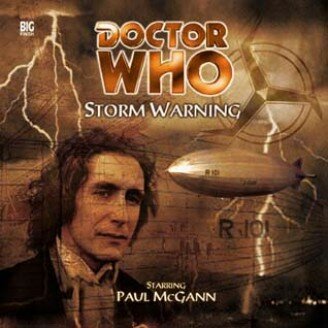
2001 saw things continue to get more exciting and more hopeful for Doctor Who. The year was most notable for Paul McGann’s return to the role of the 8th Doctor, finally continuing his era that had started with the TV Movie. January 2001 saw the release of Storm Warning, the first of a four-story season of full-cast audio dramas released monthly featuring the 8th Doctor and his new companion Charlotte “Charley” Pollard (ably played by India Fisher). For many fans it really felt like the official continuation of Doctor Who as a drama production. Years later, with the 8th Doctor mentioning his Big Finish audio companions (including Charley) on screen in Night of the Doctor, it only confirmed what they had felt all along.
But Big Finish weren’t the only ones to produce a new Doctor Who drama this year. 2001 also saw the first new drama broadcast by the BBC since the 1996 TV Movie - only, as befitting the times, it was a broadcast via the internet. The webcast of Death Comes to Time began this year, starring Sylvester McCoy as the Doctor and Sophie Aldred as Ace. Although most fans have since not considered this a “canonical” adventure, it was nonetheless an important development in the return of Doctor Who to our television screens. This was the first new story that you could watch since the TV Movie (the webcast included some animation) and it’s success established for the BBC Doctor Who‘s status as a growing, popular brand on the internet and would directly lead to more animated webcast adventures in the years to come.
Posted by Luca on Saturday, November 30 at 5:51 pm
(225) Comments
November 23, 2013
Happy 50th Anniversary
From the Radio Times, November 14, 1963.
Who know that…
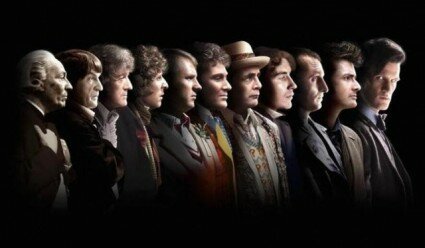
Would lead to this…?
Happy golden anniversary Doctor Who. You continue to be wonderful. In every sense of the word.
Posted by Graeme on Saturday, November 23 at 7:04 am
(0) Comments
November 17, 2013
50 Glorious Years: Episode 38 - 2000
_thumb.jpg)
Doctor Who soldiered on in 2000 unaffected by the lack of any prospects for a new television series. There had been talk in the previous year for a project that the press and DWM had dubbed “Doctor Who 2000”, as BBC1 Controller Peter Salmon had expressed interest in reviving the show with one Russell T. Davies - however, after just a couple of meetings the project was put on ice because it was believed that the rights to make a tv series now lay with BBC Films (as part of any co-production deal with any (likely US) studio that wanted to fund a cinematic Doctor Who movie. It was encouraging note that stayed with fans in 2000, even if it was somewhat annoying that a film which might never be made was scuppering a new series, it was nice that you didn’t need to be named “Alan Yentob” in order to be a BBC1 Controller who wanted to see Doctor Who come back. The enthusiasm for Doctor Who at the BBC also seemed to be exhibited by a new comedy sketch programme called Dead Ringers, which did more excellent Doctor Who sketches - it appeared more and more as though there were Doctor Who fans who were professionals now working with or in the BBC or UK television in general. It bode well for the future, with a belief that one day the show would have to come back because there would be too many people working in British television who grew up with the show and would want it to come back - which in a few years time, is exactly what happened.
In the meantime, there were now two strains of Doctor Who fiction that were going strong in the year 2000 - the books, and the audios. The books had a major sea-change occur mid-year with the publication of The Ancestor Cell and the back-to-basics The Burning, which led a new arc for the books that wiped out much of the previous book continuity and which got many fans of the novels excited once more. The Big Finish audios meanwhile were a great success and moved to a monthly release schedule in 2000, still just with stories starring Peter Davison, Colin Baker or Sylvester McCoy. This was to change for 2001, with one of the most exciting announcements in 2000 being the return of Paul McGann to the role of the Doctor, as he had agreed to star in four Big Finish full-cast audio dramas. Paul McGann was no longer just an actor who had played the Doctor once on-screen. But more on that in next week’s exciting installment of 50 Glorious Years…...
Posted by Luca on Sunday, November 17 at 10:16 am
(0) Comments

The Doctor Who Blog is a collaborative weblog put together by the people at the Doctor Who Information Network that bring you Enlightenment, the most dangerous Doctor Who fanzine in the world.
The Doctor Who Blog's mission is to provide witty and insightful commentary on the world of Doctor Who in all its various forms. And to make several bad puns and references to jokes Tom Baker once made.

To Monthly Archives
Recent Entries
- The Companion Departures - #7 - Susan
- The Companion Departures - #9 and #8 - Ian Chesterton and Barbara Wright
- The Companion Dpeartures - #11 & #10 - Jamie McCrimmon and Zoe Herriott
- The Companion Departures - #12 Steven Taylor
- The Companion Departures - #13 Amy Pond and Rory Williams
- The Companion Departures - #14 Tegan Jovanka
- The Companion Departures - #15 - Sara Kingdom
- The Companion Departures - #16 - Katarina
- The Companion Departures - #17 - Vicki
- The Companion Departures - #18 - Vislor Turlough
- The Companion Departures - #19 Mickey Smith
- The Companion Departures - #20 - Rose Tyler
- The Companion Departures - #21 - Martha Jones
- The Companion Departures - #22 - Captain Jack Harkness
- The Companion Departures - #23 - Harry Sullivan

